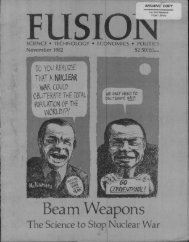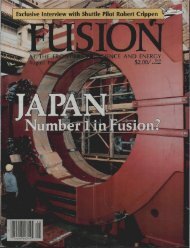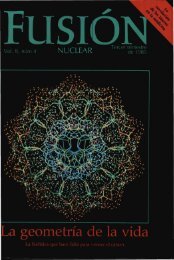feudal party has been the lowest of the three conditions continues to progress toward a condition of greatof soul. The condition most favorable to our cause has power. This uplifting of that nation to envied leaderbeenthe elevation of the condition of numerous souls ship in natural science and great progress in manufacinprogress toward the highest. Herr Wilhelm von tures, has been the benefit engendered by the smallHumboldt has emphasized this principle in his new circles of leading personalities allied to Herr Alexanderprogram for the general education of the population von Humboldt. The productions of Herr List and theof Prussia, a program consistent with the principles of contributions of M. Camot, are among those whichDr. Franklin and other leaders of our own republic, have contributed a great part most directly.According to Herr Humboldt's program, public schools This was the source of the benefits Dr. <strong>Marx</strong>'smust providea was aeach future citizen of the nation with intellect received when he child and youth inthorough education in the classics and the rudiments Trier, and every impulse which has merit within his! of natural science. This work of the public schools known work is a benefit from that source. At Berlin,must bring forth each of the best potentialities of the under the wicked influence of Professors Hegel, Savigyouth.Until this work of the public schools has been ny, and Feuerbach, Dr. <strong>Marx</strong>'s intellect was corrupted.completed, it is an error to prepare a student for an}' He became an instrument of the Jacobin cause, and ofnarrow choice of future branch of trade or profession, sl that feudal party which traffics profitably in the hedon-In real history, the quality of society has been istic self-degradation of the numerous. In the mostimproved from the top down, not from the bottom essential part of this corruption of his mind, he adoptedup. The great inventions in knowledge of the natural Herr Feuerbach's doctrine of the cult of Isis. Since, hesciences, which have been the distinguishing feature of has regarded man in society as no better than a higherthe modem age, have been the production of small quahty among the beasts. For these beasts, Dr. <strong>Marx</strong>circles of extraordinary intellects, who have dedicated believes himself, desire all of the advantages belongingthemselves to acquire the greatest knowledge and to to humanity, inasmuch as a beast can recognize theimprove that knowledge. Herr Leibniz, Dr. Franklin, self-interests of that alien species which is humanity.and M. Camot are among the excellent examples of Toward those who remind him that the superior partthis. It was a tiny group of conspirators who aroused of human nature is a power of reason denied to theand directed the citizens of this nation to create our beast, Dr. <strong>Marx</strong> summons hatred.republic. It was M. Carnot and a small circle of such Whether Dr. <strong>Marx</strong> knows that he hates Socrates,persons who created great advancements in industry, Plato, St. Augustine, or Herr Leibniz, we do notnatural science, and warfare, from above the experi- know. He hates their cause, and recognizes that cause inence and opinion of the most numerous, the party which organized the Ninth of Thermidor. If heAs civilization has prospered from these acts of acknowledges what was reflected in the great accomdedicationby the least numerous of our party, it has plishments of Prussia's science and manufactures, hisbeen the least numerous conspirators of the feudal philosophical outlook collapses in its entirety, as simpartywhich have trafficked in the hedonistic degrada- ply and surely as the mere existence of the Americantion of the numerous to accomplish ruin. System refutes entirely his perverted admiration of theIn Prussia today, there is a tendency for the good feudal cause of the British East India Company. Thisand a powerful tendency for the evil. Amid that contest fear gives force to his hatred against the ,cause ofamong circles of that nation's highest rank, Prussia M. Carnot.CAMPAIGNER / October 1983 29
AppendixOne Hundred Years Later:KARLMARXAs an Accountantby Lyndon H. LaRouche, Jr.There are three aspects of the manuscript which de- presenting a husband with everything but the last piecemand supplementary observations in light of devel- of evidence, that his wife is spending her afternoonsopments within economics during the past hundred working as a prostitute.years.The first and principal criticism to be made in that <strong>Marx</strong> as an Accountantlight, is that there exists today no competent practiceof national-income accounting which does not appear For all serious economists, the simple accounting workto owe a debt to <strong>Karl</strong> <strong>Marx</strong>'s Capital. The most notable of political economy assembles and correlates threeexample is the work of Soviet-trained Harvard Uni- sets of statistics. The first counts the amount of goodsversity economist, Professor Wassily Leontief, in de- produced per capita, both by employed labor and asvelopment of the present National Income Accounting the average quantity made available for the populationsystem of the United States. Although the author's as a whole. The second is the amount of such laborfailure to forewarn his readers of such a possible effect required to produce the goods required by the popudoesnot weaken his argument on any of the points of lation as a whole. The third is the prices, in total andcriticism he addresses to <strong>Marx</strong>'s Capital, the omission in detail, assigned to those produced goods and theshould not be overlooked in the publication of that labor employed in their production.manuscript today. The individual material goods produced by theThe second criticism which we treat here, turns society for its own consumption are most broadlyour attention to the author's references to <strong>Marx</strong>'s assorted into two general classifications. The first,incompetence in mathematical physics. He indicates usually described as consumer goods, represents thosethat <strong>Marx</strong>'s resort to the "cell form" of analysis in final products ,of the production of tangible goodsCapital is evidence of such a fault. That argument is which are consumed by households of the population.accurate, and is unquestionably a relevant point to be The second, usually described as capital goods, areidentified in connection with <strong>Marx</strong>'s hostility to Leib- tangible goods, or other physical improvements, conniz,Carnot, et al. We tend to believe that the author sumed by production and transportation.understood his own point correctly, but the typical From this initial point of accounting practice, thereader of today might not be certain that this is so. economist must correlate, first, all of the data exceptFinally, we should not ignore the fact, that the money prices, by portraying the total production andauthor marches right up to the brink of stating that consumption of such physical goods as forming a<strong>Karl</strong> <strong>Marx</strong> was "brainwashed" at Berlin by agents of closed cycle. The correct form of representation of thisthe Scottish Rite there. The facts cited to this effect are cycle is that elaborated by this writer.1 We begin withaccurate, and the argument, as far as the author the total population of the society, defining this as adevelops it, is soundly composed. The effect is like census of housrholds, of which individual persons are30 Special Supplement / CAMPAIGNER
















